
Facebook has announced that they will be shutting down their facial recognition system and remove all the faceprints of more than 1 billion users, which will affect the automatic photo and video tagging featurer once deleted.
Aside from the automatic tags, there are other reasons as to why the social media giant is deleting its system.
Facebook Deleting 1 Billion Faceprints
According to the blog post of Facebook, they will delete over 1 billion faceprints of people, and it will no longer recognize people in photos and videos, which was previously the social media giant's template to identify a person in a post easily.
Aside from the photo and video recognition in a post, it will also affect the automatic alt text (AAT) system that uses an AI tool to provide image descriptions for blind and visually impaired people. This only means that Facebook users will not be notified if they or one of their friends is in an image post. Since it is an alternative text description, the names of the identified people will not appear on the screen, which is part of the Facebook facial recognition system.
Facebook vice president of artificial intelligence Jerome Pesenti added in the blog post that this shift will represent one of the largest changes in the usage of facial recognition in the history of technology. Positive enough, Pesenti stated that the company still finds the facial recognition system as a powerful tool in terms of identity verification and preventing impersonation as well as fraud.
"We believe facial recognition can help for products like these with privacy, transparency, and control in place, so you decide if and how your face is used. We will continue working on these technologies and engaging outside experts," Pesenti furthered.
Moreover, Meta, the new company parent of Facebook, also clarified that they are trying to weigh the positive benefits of the faceprints against growing societal concerns, especially since regulators have yet to issue clear guidelines for its usage.
For this reason, the social media giant believes that limiting the use of facial recognition to a narrow range of cases is suitable--such cases include the service that assists Facebook users to have access to a locked account, unlock the personal device, as well as verify their identity in financial products. When used properly, facial recognition can be both useful and socially acceptable in certain settings.
Facebook Changes Name to Meta
Facebook unveiled last Thursday that it has replaced its company name to Meta. However, Facebook retains the name for the social media platform.
With this name renewal, FB claimed it would allow them to focus on developing technology for the "metaverse," which it envisions as the next incarnation of the internet.
On the other hand, the corporation is also dealing with a public relations crisis to date after whistleblower Frances Haugen disclosed the documents that show several harmful effects that Meta and its apps have caused.
There is no clarification, as of writing, if this facial recognition removal is related to the crisis that Facebook currently faces.









